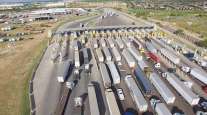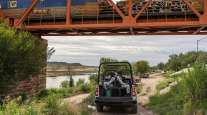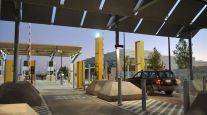Mexico Border Delays Seen Weighing on US Investment, Factories
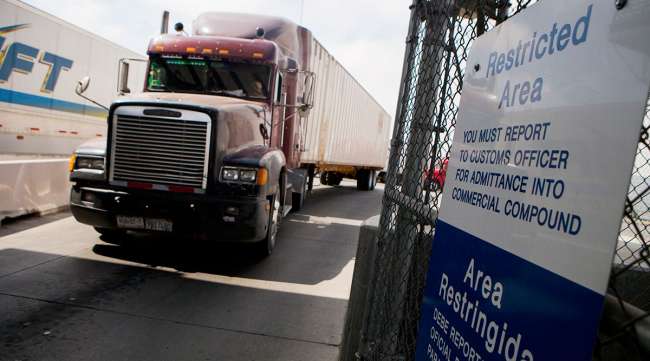
More cargo from Mexico to the United States is being held up at the border, accompanied by increasing evidence that such delays are dimming prospects for American companies.
Slower trade between the countries since federal border officers recently were redirected to deal with a surge in migrants has been socking businesses with additional shipping costs. The effects likely will cause a modest headwind for second-quarter nonresidential investment growth — which cooled at the start of the year — and already helped to push a U.S. factory gauge to a two-year low in April, according to Bank of America Corp.
“The delays generate a meaningful direct cost for businesses,” economist Stephen Juneau said in an e-mail May 6. The disruption may have a significant impact on the flow of goods, as more than 86% of Mexican imports enter the U.S. by land, and impose some $5.5 million in additional costs on U.S. businesses each month, he wrote in a report May 3.
Trucking company Werner Enterprises Inc. said on an April 25 earnings call that it expects border crossing to be “slow for the foreseeable future.”
“Freight is still crossing the border at a very slow rate by comparable standards,” said Derek Leathers, CEO of the Omaha, Neb.-based company.
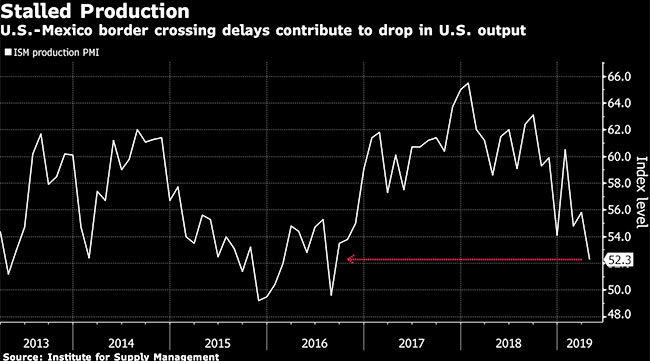
Werner ranks No. 15 on the Transport Topics Top 100 list of the largest for-hire carriers in North America.
U.S. Customs and Border Protection said March 27 that trade processing would slow, with as many as 750 officers from crossings in the San Diego, Tucson, Ariz.; El Paso and Laredo, Texas, regions being re-assigned. President Donald Trump the next day renewed threats to close the border.
The Institute for Supply Management’s factory survey last week showed April conditions at the weakest since October 2016, though still expansionary. The production component also fell to a more than two-year low, which Juneau said likely was in part because of border delays.
Mexico border issues “are a potential threat,” one unidentified respondent from a machinery company said in ISM’s survey, while a computer and electronic products company said, “Border crossing delays are slowing supplier deliveries.” A transportation-equipment company said it is closely watching the Mexico border situation.
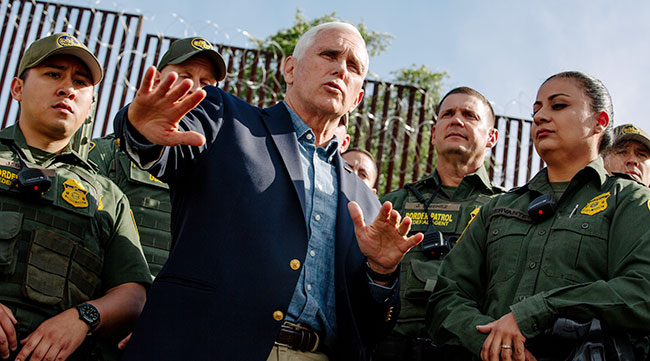
Vice President Mike Pence visited a section of the U.S.-Mexico border in Arizona on April 11. (Caitlin O'Hara/Bloomberg News)
Federal Reserve Bank of Dallas President Robert Kaplan also has cited the trade disruptions, citing average daily truck crossings at El Paso falling by half to 1,500. While it hasn’t had a material impact on Texas, it could.
“It’s something we’re watching,” he told CNBC on May 3.
“A lot of the commercial traffic, we’re hearing from businesses, is being impeded” he said. “This is affecting logistics and supply chains, not just in Texas and the Southwest, but also in the Midwest.”
Juneau cited comments last month by customs officials saying cargo processing times were multiplying at some of the busiest ports of entry. Waits at Brownsville, Texas, recently were at two hours, compared with no wait a year earlier, while the 4½-hour delay at Otay Mesa, Calif., was up from 50 minutes a year before — and at the end of one day, 175 trucks at that crossing were unprocessed, according to a CBP operations director.
Bank of America multiplied the delays by the average hourly earnings of production and nonsupervisory workers in transportation and warehousing, and then multiplied the cost per truckload by the total number of trucks that crossed through each of the two ports last year. Per truckload, delays are likely costing U.S. businesses an additional $40 to $80, Juneau estimated.
“Additionally, in order to maintain the current pace of production, businesses are likely absorbing the unplanned cost, which could affect hiring and investment plans,” he said.


